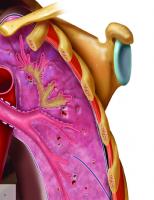Best of Five MCQs for the European Specialty Examination in Nephrology (Oxford Higher Specialty Training) 0192844164, 9780192844163
The Best of Five MCQs for the European Specialty Certificate Examination in Nephrology (ESENeph) is a dedicated revision
133 48 15MB
English Pages 272 [273] Year 2023
Cover
Best of Five MCQs for the European Specialty Examination in Nephrology
Edited by
Copyright
Contents
CONTRIBUTORS
Abbreviations
1 Glomerulonephritis, tubulointerstitial nephritis, and vasculitis
Questions
Answers
2 Acute kidney injury and acute renal replacement therapy
Questions
Answers
3 Disorders of fluid, electrolytes, and acid base
Questions
Answers
4 Chronic kidney disease, haematuria, and proteinuria
Questions
Answers
5 Renal bone disease and renal anemia
Questions
Answers
6 Cardiovascular disease, hypertension, and diabetes (Part A)
Questions
Answers
7 Cardiovascular disease, hypertension, and diabetes (Part B)
Questions
Answers
8 Renal stone disease, urinary tract infection, and obstruction
Questions
Answers
9 Inherited and rarer diseases
Questions
Answers
10 Peritoneal dialysis
Questions
Answers
11 Haemodialysis
Questions
Answers
12 Renal transplantation
Questions
Answers
13 Renal disorders in pregnancy
Questions
Answers
14 Nutrition, safe prescribing, and conservative management
Questions
Answers
Index
Recommend Papers

- Author / Uploaded
- Shafi Malik (editor)
File loading please wait...
Citation preview
Best of Five MCQs for the European Specialty Examination in Nephrology
Best of Five MCQs for the European Specialty Examination in Nephrology Edited by
Shafi Malik Consultant Transplant Nephrologist, University Hospitals of Coventry and Warwickshire NHS Trust, UK
Great Clarendon Street, Oxford, OX2 6DP, United Kingdom Oxford University Press is a department of the University of Oxford. It furthers the University’s objective of excellence in research, scholarship, and education by publishing worldwide. Oxford is a registered trade mark of Oxford University Press in the UK and in certain other countries © Oxford University Press 2024 The moral rights of the author have been asserted First Edition published in 2024 All rights reserved. No part of this publication may be reproduced, stored in a retrieval system, or transmitted, in any form or by any means, without the prior permission in writing of Oxford University Press, or as expressly permitted by law, by licence or under terms agreed with the appropriate reprographics rights organization. Enquiries concerning reproduction outside the scope of the above should be sent to the Rights Department, Oxford University Press, at the address above You must not circulate this work in any other form and you must impose this same condition on any acquirer Published in the United States of America by Oxford University Press 98 Madison Avenue, New York, NY 006, United States of America British Library Cataloguing in Publication Data Data available Library of Congress Control Number: 2023935576 ISBN 978–0–9–28446–3 DOI: 0.093/oso/97809284463.00.000 Printed and bound by CPI Group (UK) Ltd, Croydon, CR0 4YY Oxford University Press makes no representation, express or implied, that the drug dosages in this book are correct. Readers must therefore always check the product information and clinical procedures with the most up-to-date published product information and data sheets provided by the manufacturers and the most recent codes of conduct and safety regulations. The authors and the publishers do not accept responsibility or legal liability for any errors in the text or for the misuse or misapplication of material in this work. Except where otherwise stated, drug dosages and recommendations are for the non-pregnant adult who is not breast-feeding Links to third party websites are provided by Oxford in good faith and for information only. Oxford disclaims any responsibility for the materials contained in any third party website referenced in this work.
PREFACE
In February 2020, the Specialty Certificate in Nephrology and the European Certificate in Nephrology exams were combined into a single exam called the European Specialty Examination in Nephrology. There was a need for a preparatory book that addressed the standards of this new exam and I intended to fulfil that need. Given that this was a Pan European exam, I was keen to have key opinion leaders from Europe and North America to author chapters, in addition to having diversity of authors. Contents of this book mirrors the ESENeph exam blueprint and the question writing style is in keeping with the Royal College of Physicians house style. Questions have detailed answers along with further reading suggestions and at the end of every chapter, there are key take home messages. The intention behind the format of this book is not just to equip candidates with exam focused knowledge but also to upskill them by providing evidence-based answers and take home messages. My father was a writer and I wanted to follow his footsteps, I have thoroughly enjoyed editing this book and a lot of effort has gone into writing questions. I am thankful to all the authors for their effort, not least my wonderful wife Liza, my kids Roshan and Rihaan while I was putting up with deadlines and my parents for what I am today. Thank you.
CONTENTS
Contributors Abbreviations
ix xi
Glomerulonephritis, tubulointerstitial nephritis, and vasculitis Questions Answers
6
2 Acute kidney injury and acute renal replacement therapy Questions
25
Answers
36
3 Disorders of fluid, electrolytes, and acid base Questions
45
Answers
53
4 Chronic kidney disease, haematuria, and proteinuria Questions
59
Answers
77
5 Renal bone disease and renal anemia Questions Answers
95 03
6 Cardiovascular disease, hypertension, and diabetes (Part A) Questions
09
Answers
4
viii
Contents
7 Cardiovascular disease, hypertension, and diabetes (Part B) Questions
27
Answers
35
8 Renal stone disease, urinary tract infection, and obstruction Questions
4
Answers
46
9 Inherited and rarer diseases Questions
5
Answers
60
0 Peritoneal dialysis Questions
67
Answers
75
Haemodialysis Questions
8
Answers
87
2 Renal transplantation Questions
95
Answers
207
3 Renal disorders in pregnancy Questions
27
Answers
225
4 Nutrition, safe prescribing, and conservative management Questions
233
Answers
24
Index
247
CONTRIBUTORS
Hadeel Ahmed Specialist Registrar Nephrology, University Hospitals of Leicester NHS Trust, Leicester, UK Julia Arnold Consultant Nephrologist, Lister Hospital, Stevenage, UK Reem Al-Jayyousi Associate Professor of Medicine, Mohammed Bin Rashid University of Medicine and Health Sciences, Dubai, UAE Jon Barratt Consultant Nephrologist, University Hospitals of Leicester NHS Trust, Leicester, UK Miriam Berry Consultant Nephrologist, Queen Elizabeth Hospital, Birmingham, UK Sue Carr Consultant Nephrologist, University Hospitals of Leicester NHS Trust, Leicester, UK Daniela Viramontes-Hörner Academic Dietician, University of Nottingham, Royal Derby Hospital Campus, Nottingham, UK Indranil Dasgupta Consultant Nephrologist, Birmingham Heartlands Hospital, Birmingham, UK Jorge JESÚS-SILVA Consultant Transplant Nephrologist, University Hospitals of Leicester NHS Trust, Leicester, UK Farid Ghalli Consultant Nephrologist, University Hospitals Sussex, Brighton, UK Rizwan Hamer Consultant Nephrologist, University Hospitals of Coventry and Warwickshire NHS Trust, UK Mohammed Awais Hameed Consultant Nephrologist, Birmingham Heartlands Hospital, Birmingham, UK Katherine Hull Specialist Registrar Nephrology, University Hospitals of Leicester NHS Trust, Leicester, UK Isma Kazmi Consultant Nephrologist, St James University Hospital, Leeds, UK Hariharan Iyer Consultant Nephrologist, London Health Sciences Center, Ontario, Canada Gauri Shankar Jagadesh Consultant Nephrologist, Queen Elizabeth Hospital, Birmingham, UK Saleh Kaysi Consultant Nephrologist, Brugmann University Hospital, Belgium Rumeyza Kazancioglu Professor of Nephrology, Bezmialem Vakif University, Istanbul, Türkiye Kateryna MacConaill Consultant Nephrologist, University Hospitals of Leicester NHS Trust, Leicester, UK Huda Mahmoud Consultant Nephrologist, Walsall Manor Healthcare Trust, UK
x
CONTRIBUTORS
Noor Mahmoud Pharmacist, Black Country Partnership Trust, UK Shafi Malik Consultant Transplant Nephrologist, University Hospitals of Coventry and Warwickshire NHS Trust, UK Valentin Maisons Specialist Nephrologist, University Hospital of Tours, Tours, France Safak Mirioglu Nephrology Fellow Bezmialem Vakif University, Istanbul, Türkiye Shingai Pepereke Specialist Registrar Nephrology, University Hospitals of Leicester NHS Trust, Leicester, UK Javeria Peracha West Midlands Specialist Registrar Nephrology Alexandra Riding Consultant Nephrologist, Royal Free London NHS Foundation Trust, UK Steve Riley Consultant Nephrologist, University Hospital of Wales, Cardiff, UK Dwarak Sampathkumar Consultant Nephrologist, Meenakshi Hospital, Thanjavur, India Haresh Selvaskandan Specialist Registrar Nephrology, University Hospitals of Leicester NHS Trust, Leicester, UK Murugan Sivalingam Consultant Nephrologist, Sundaram Medical Foundation, Chennai, India
ABBREVIATIONS
AA
aristolochic acid
AAN
aristolochic acid nephropathy
AAV
ANCA-associated vasculitis
AD
autosomal dominant
ADPKD autosomal dominant polycystic kidney disease AG
anion gap
AHS
allopurinol hypersensitivity syndrome
aHUS
atypical haemolytic uraemic syndrome
AIN
acute interstitial nephritis
AKI
acute kidney injury
AML angiomyolipoma APD
automated peritoneal dialysis
ANCA
Antineutrophilic cytoplasmic antibody
AVS
adrenal vein sampling
BAFF
B-cell activating factor
BMI
body mass index
BUN
blood urea nitrogen
C3GN
C3 glomerulonephritis
CAPD
continuous ambulatory peritoneal dialysis
CCPD
continuous cyclic peritoneal dialysis
CRRT
continuous renal replacement therapy
CKDu
chronic kidney disease of unknown aetiology
CRP
C-reactive protein
DAD
directed altruistic donor
DDS
dialysis disequilibrium syndrome
DI
diabetes insipidus
DRA
dialysis-related amyloidosis
DRESS
drug rash with eosinophilia and systemic symptoms
EF
ejection fraction
eGFR
estimated glomerular filtration rate
EGPA
eosinophilic granulomatosis with polyangiitis
xii
Abbreviations
EPS
encapsulating peritoneal sclerosis
ERT
recombinant enzyme replacement therapy
ESA
erythropoietin-stimulating agent
ESRD
end-stage renal disease
ESI
exit site infection
ESR
erythrocyte sedimentation rate
FSGS
focal segmental glomerulosclerosis
FUN
fluid urea nitrogen
GBM
glomerular basement membrane
GLA
γ-linolenic acid
GN glomerulonephritis GP
general practitioner
GPA
granulomatosis with polyangiitis
HD haemodialysis IAP
intra-abdominal pressure
IgAN
IgA nephropathy
IP intraperitoneal ISN/RPS International Society of Nephrology/Renal Pathology Society KDIGO Kidney Disease: Improving Global Outcomes LAC
levamisole-adulterated cocaine
LAMP
lysosome-associated membrane protein
MAHA
microangiopathic haemolytic anaemia
MBD
mineral bone disease
MCKD
medullary cystic kidney disease
MMF
mycophenolate mofetil
MN
membranous nephropathy
MPGN
membranoproliferative glomerulonephritis
MRSA
methicillin-resistant Staphylococcus aureus
MSK
medullary sponge kidney
NSTEMI non-ST elevation myocardial infarction OAT
organic anion transporter
PAC
plasma aldosterone concentration
PCNL
percutaneous nephrolithotomy
PD
peritoneal dialysis
PEG
polyethylene glycol
PET
pre-eclampsia
PGA
pyroglutamic metabolic acidosis
PIGN
post-infectious glomerulonephritis
PLA2R
phospholipase A2 receptor
Abbreviations
PTE
post-transplant erythrocytosis
PTH
parathyroid hormone
PTHrP
parathyroid hormone-related peptide
RAS
renin–angiotensin system
RRF
residual renal function
RRT
renal replacement therapy
RVT
renal vein thrombosis
SCAR
severe cutaneous adverse reaction
SJS
Stevens–Johnson syndrome
SLE
systemic lupus erythematosus
Sosm
serum osmolality
SPK
simultaneous pancreas–kidney
SUN
serum urea nitrogen
TBMN
thin basement membrane nephropathy
TEN
toxic epidermal necrolysis
TIN
tubulointerstitial nephritis
TINU
tubulointerstitial nephritis and uveitis syndrome
TLS
tumour lysis syndrome
TMA
thrombotic microangiopathy
TRAS
transplant renal artery stenosis
TSC
tuberous sclerosis complex
UF ultrafiltration VEGF
vascular endothelial growth factor
VTE
venothromboembolic event
xiii
chapter
GLOMERULONEPHRITIS, TUBULOINTERSTITIAL NEPHRITIS, AND VASCULITIS QUESTIONS
. A 54-year-old man is referred from the ENT clinic. He presented with recurrent ear infections. He had five courses of antibiotics over the previous 0 months for recurrent ear pain, discharge, and difficulty hearing. On questioning, he reports being more breathless on exertion and to have lost 5 kg in weight over the last few months. On examination, he appeared lethargic and pale. His pulse was 92 beats/min and regular; his BP was 42/75 mmHg and his oxygen saturation was 96% on room air. His chest was clear on auscultation. Investigations: c-ANCA serum CRP white cell count
positive (negative at :20) 79 mg/L (
![Best of Five MCQS for the European Specialty Examination in Gastroenterology and Hepatology [2 ed.]
9780192659446](https://ebin.pub/img/200x200/best-of-five-mcqs-for-the-european-specialty-examination-in-gastroenterology-and-hepatology-2nbsped-9780192659446.jpg)
![Best of Five MCQS for the European Specialty Examination in Gastroenterology and Hepatology [2 ed.]
2020945295, 9780198834373, 0198834373, 9780192571823, 0192571826](https://ebin.pub/img/200x200/best-of-five-mcqs-for-the-european-specialty-examination-in-gastroenterology-and-hepatology-2nbsped-2020945295-9780198834373-0198834373-9780192571823-0192571826.jpg)

![SBAs for the Final FRCA (Oxford Specialty Training: Revision Texts) [1 ed.]
019880329X, 9780198803294](https://ebin.pub/img/200x200/sbas-for-the-final-frca-oxford-specialty-training-revision-texts-1nbsped-019880329x-9780198803294.jpg)
![Long Cases for the Final FRCR 2B (Oxford Specialty Training: Revision Texts) [Illustrated]
0199590001, 9780199590001](https://ebin.pub/img/200x200/long-cases-for-the-final-frcr-2b-oxford-specialty-training-revision-texts-illustrated-0199590001-9780199590001.jpg)
![Practice Questions for the Dermatology Specialty Examination [4th Edition]
0956640079, 9780956640079](https://ebin.pub/img/200x200/practice-questions-for-the-dermatology-specialty-examination-4th-edition-0956640079-9780956640079.jpg)



